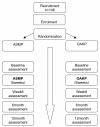Self-management for osteoarthritis of the knee: does mode of delivery influence outcome?
- PMID: 20334688
- PMCID: PMC2850876
- DOI: 10.1186/1471-2474-11-56
Self-management for osteoarthritis of the knee: does mode of delivery influence outcome?
Abstract
Background: Self-management has become increasingly popular in the management of chronic diseases. There are many different self-management models. Meta analyses of arthritis self-management have concluded that it is difficult to recommend any one program in preference to another due to inconsistencies in the study designs used to evaluate different programs.The Stanford Arthritis Self-Management Program (ASMP), most commonly delivered by trained lay leaders, is a generic program widely used for people with rheumatological disorders. We have developed a more specific program expressly for people with osteoarthritis of the knee (OAKP). It includes information designed to be delivered by health professionals and results in improvements in pain, function and quality of life.
Aim: To determine whether, for people with osteoarthritis (OA) of the knee, the OAKP implemented in a primary health care setting can achieve and maintain clinically meaningful improvements in more participants than ASMP delivered in the same environment.
Methods/design: The effectiveness of the programs will be compared in a single-blind randomized study.
Participants: 146 participants with established OA knee will be recruited. Volunteers with coexistent inflammatory joint disease or serious co-morbidities will be excluded.
Interventions: Participants will be randomised into either OAKP or ASMP groups and followed for 6 months.
Measurements: Assessments will be immediately before and after the intervention and at 6 months. Primary outcome measures will be WOMAC and SF-36 questionnaires and a VAS for pain. Secondary outcomes will include balance, tested using a timed single leg balance test and a timed step test and self-efficacy. Data will be analysed using repeated measures ANOVA.
Discussion: With an aging population the health care costs for people with arthritis are ever increasing. Although cost analysis is beyond the scope of this study, it is reasonable to expect that costs will be greater when health professionals deliver self-management programs as opposed to lay leaders. Consequently it is critical to examine the relative effectiveness of the primary care management strategies available for OA.
Trial registration: This study is registered with the Australian New Zealand Clinical Trials Registry: 12607000031460.
References
-
- Access Economics. Painful Realities: The economic impact of arthritis in Australia in 2007. Canberra: Arthritis Australia; 2007.
Publication types
MeSH terms
LinkOut - more resources
Full Text Sources
Molecular Biology Databases


